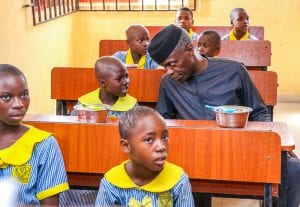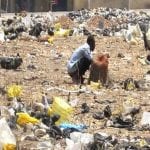Details are now emerging from the Federal Government on how the Buhari administration welcomed the idea of having independent verification of its Social Investment Programmes.
“No less than three independent groups have gone to the field besides other independent media reports to check the claims of the government on the impact of the ongoing four SIP schemes, revealed a senior official in the Presidency Tuesday night.
The independent economic groups are Africa Network for Environmental and Economic Justice, ANEEJ, Action Aid and the National Economic Summit Group, each of which have handled an on the ground unfettered appraisal of the SIPs and have confirmed independently the claims of the Federal Government.
“This was important to the President and the Vice President in order to ensure that the administration was not just dependent on reports that come in from bureaucrats and those entrusted with the implementation, said the official who is familiar with the matter.
” This is besides other official means of verification including when the beneficiaries themselves came out in their thousands on Monday in Kano to offer their gratitude and prayers for the President’s second term.”
This newspaper gathered that the three groups whose reports have been received by the administration commended the National Social Investment Programmes (N-SIP) for its impact on alleviating poverty, providing jobs for unemployed Nigerians and improving small businesses nationwide.
ACTION AID
In separate reports made available to the Presidency, the groups – Action Aid, of Africa Network for Environment and Economic Justice (ANEEJ), and the Nigerian Economic Summit Group (NESG) – commended the NSIP for meeting the urgent needs of Nigerians in different areas including providing employment, supporting small businesses and poverty alleviation.
The NSIP is a social investment scheme which started in 2016 under President Muhammadu Buhari administration, include the N-Power programme, the National Home-Grown School Feeding Programme (NHGSFP), the Conditional Cash Transfer (CCT) programme and the Government Enterprise and Empowerment Programme (GEEP), which consists of the MarketMoni, FarmerMoni and TraderMoni schemes.
According to its 2018 Third-party Monitoring Report, Action Aid focused on three out of four programmes namely: Home-Grown School Feeding Programme (NHGSFP), N-Power, and the GEEP schemes across the 36 states and the FCT.

The report noted that the Social Investment Programmes, despite the challenges encountered, are effective and relevant in the states because their expected outcomes have been achieved.
“The programmes are also relevant because they have met the urgent needs of beneficiaries. The NSIP also are, no doubt, aligned with the international and national expectations of social protection interventions, and have contributed towards achieving the Sustainable Development Goals (SDGs).
The report described the school feeding programme as effective as “most expected outcomes have been achieved: feeding of pupils in primary 1 to 3 reportedly resulted in increased enrolment in schools.”
Similarly, it noted that through the GEEP, small business owners in Nigeria have ‘gained access to micro-credit finance to expand their businesses.” Graduates were trained and linked to paid employment while non-graduates were equipped with skills to be self-employable through the N-Power programmes.
The N-Power job scheme provides jobs for 500,000 young Nigerian graduates and 20,000 non-graduates in different areas of public services. Known as N-Power volunteers, they are deployed in all the 774 local government areas of the 36 states.
The report also confirmed that the Home-Grown School Feeding programme is now feeding over 9.5 million children in public schools in 31 states nationwide; while the GEEP loans, comprising Market Moni, FarmerMoni and Trader Moni is providing micro-credit loans to over 2 million Nigerian petty traders, artisans and businessmen nationwide.
ANEEJ & THE INDEPENDENT OVERSIGHT ON ABACHA LOOT
In the same vein, findings from Independent Civil Society Organisations Monitoring the use of returned $322.5million Abacha Loot on Conditional Cash Transfer (CCT) to Poorest of Poor Nigerians show that the money is largely going to poor Nigerians.
According to the Executive Director, ANEEJ, Rev. David Ugolor at a Press Conference in Abuja in May to present the findings of Civil Society Organisations, said “the monitoring exercise conducted spot checks on the Funds disbursed in the August to September payment round to 30,778 beneficiaries in 11 States across five geopolitical zones of Nigeria.”
ANEEJ further states that, in spite of some few challenges associated with the exercise, the monitoring carried out in December 2018 shows that the returned Abacha loot disbursed for August-September 2018 payment round was received by target beneficiaries as confirmed by 78.8% of households visited by the monitoring team.
The field monitoring of the use of the returned Abacha loot is being carried out by Civil Society Organisations led by the (ANEEJ) under the Transparency and Accountability in the Recovery and Management of looted Assets (MANTRA) project being supported by UKAID under the Anti-Corruption in Nigeria (ACORN) programme.
“The exercise spanned two weeks and was conducted across reporting levels of the National Cash Transfer Office, their State and Local Government structures as well as the National Social Safety-Nets Coordinating Office with their States officials. Data were reviewed end-to-end from the Central Bank of Nigeria, World Bank, Conditional Cash Transfer programme, and the National Beneficiary register.” Ugolor said.

“Our findings show that a total of 974,478,000 million naira was released from the Abacha loot to the beneficiaries for payment in the August September Payment round as at the time of the monitoring exercise. The funds disbursed from the Abacha loot comprise 80% of the funds paid at the August September payment cycle. Data retrieved from the NCTO report that 33 million dollars (3, 786, 063,783 billion naira) was released for 6 months from the Abacha loot and converted at an exchange rate of 305.45 Naira to a dollar. Bank charges of 28,560 naira was deducted.
The CSOs, among other recommendations, called for a review of the payment option for beneficiaries to include electronic transfers.
DFID
Speaking on the recovered loot and transparency in the process of disbursement, Sonia Warner, Senior Adviser, Department for International Development (DFID)-UK, said ANEEJ played a pivotal role in the Monitoring of Recovered Assets in Nigeria with Transparency and Accountability (MANTRA) Project to monitor US$322.5 million returned to Nigeria from Switzerland.
Warner said she “feels a strong sense of achievement being part of an intervention which has demonstrated that it is possible to retrieve stolen money and use it to support the victims of corruption in Nigeria.”
“During the pilot phase, MANTRA mobilised a network of civil society organisations to monitor end-to-end, the use of the US$322.5 million which the government committed to cash transfer payments for the poorest Nigerians under its National Social Investment Fund Programme. This means MANTRA’s monitoring all movements in the Central Bank Account where this money sits, down to 30,778 beneficiary households to ensure the US$22 million so far disbursed is protected from re-looting.
“This is the first time such an initiative has been piloted in Nigeria and the mobilisation of local organisations and citizens will support local ownership and sustainability,” she said, adding that the political backing from the Office of the Vice President of Nigeria, which launched MANTRA on African Anti-Corruption Day in July 2018, helped MANTRA to leverage acceptance and recognition by high-level Government stakeholders.
NESG
The most recent findings from the impact evaluation report of the Nigerian Economic Summit Group (NESG) also corroborated the findings of the CSOs and Action Aid.
The report noted that the Social investment Programmes of the Buhari administration would help reduce the number of Nigerians who live in extreme poverty if Federal Government can partner more with State Governments to scale up the programmes in the states. The NESG added that this was necessary as millions of Nigerians have benefitted from the SIPs, but that state government partnership is a challenge that should be resolved.

The CCT provides a monthly Cash Transfer of N5,000 to the poorest and most vulnerable households in the country, with the sole aim of taking them out of absolute poverty, has been able to reach over 300,000
Data from the NSIP office show that since its implementation started three years ago, the N–SIPs have impacted over 12 million
There are indications that under the Next level Agenda of the Buhari administration the N-SIPs woul
According to the senior official “this programmes are too important for the President and the VP, that they both will welcome every legitimate way to ensure that the people are truly benefiting from the first comprehensive social safety net programme in the country.”
























Leave a comment